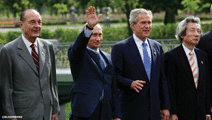
The annual meeting of the world’s richest democracies often amounts to little more than a talking shop overshadowed by events. In that sense, it was a case of déjà vu again at last weekend’s summit, hosted by Russia in St. Petersburg. The escalating crisis in the Middle East prompted a statement that cast the blame “liberally but vaguely”, as The Economist puts it, and George Bush and Jacques Chirac were unable to agree on whether the G8 had called for a ceasefire or not.
Having papered over the cracks in the Middle East, the G8 had little time to devote to the main issues on the agenda, producing only sweeping generalities on education, the struggle against infectious diseases and energy security. European countries that import gas from Russia were spooked by its decision to turn off Ukraine’s gas supplies in January over a pricing dispute. They had hoped to persuade Russia to sign the Energy Charter Treaty, designed to regulate the international energy trade and liberalise access to its gas pipelines. No go.
Russian president Vladimir Putin’s “irascible mood” hardly helped matters, says The Times. He “head-butted” President Bush by saying Russia wouldn’t want “the kind of democracy that exists in Iraq” and fended off a question about corruption by mocking Blair over Lord Levy’s arrest (see: Is New Labour sleazier than Major’s government?). It was easy for Putin to throw his weight around because he was surrounded by a “vintage crop of winged and lame-duck politicians”, says Melanie Phillips in the Daily Mail: Jacques Chirac and Japan’s Koizumi are nearing the end of their terms, Bush and Blair are embattled and the German chancellor, Angela Merkel, is being buffetted by mounting criticism at home.
Putin, at least, got what he wanted, says Nikolas Gvosdev in the International Herald Tribune. He bolstered his image as a vigorous defender of Russian national interests and the leader of a country once again taking its rightful place on the world stage; Russian commentators are almost unanimous in their belief that Russia is once again a leading power. He even managed to “spin” a deadlock over Russia’s admission to the World Trade Organisation – which would have constituted an acknowledgement of Russia’s growing role in the world economy – as evidence that he was “not so desperate for approval” to accede to all US demands. To former KGB
man Putin, order and reviving Russia’s influence are what matters – not “wishy-washy worries” about its authoritarianism and human rights, says The Economist. And with Russia’s influence growing and the chaos of the Yeltsin years overcome as high oil prices fuel rapid growth, his approval ratings are at 70%.
Yet Russia is not nearly as powerful as Putin’s success at the summit implies, according to Philip Stephens in the FT. For all its current good fortune, it is in decline: the shrinking workforce is addled with poor health and alcoholism and the country is almost completely dependent on oil and gas, as in the late Soviet era. Businesses such as gas major Gazprom are “rotting from the inside” and the firm can hardly cut off supplies to Europe as it has no alternative customers. Russia also needs foreign help to exploit Siberian oil and gas. So there was scope for the West to take a tougher line. The summit was a poker game in which, instead of calling Putin’s bluff, “the West lost its nerve”.